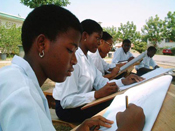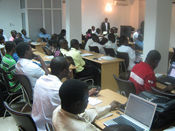




ICT in Learning
The Federal Republic of Nigeria has no specific policy regarding ICT in education. A major road block in the creation of a formal policy is the fact that there is a severe lack of electric power and telecommunications infrastructure throughout an overwhelming part of the country.
Nigeria's Education Policy places larger importance on increasing access to basic education, minimizing and eliminating inequalities in enrollment levels throughout the nation, garnering higher retention rates, and working toward long-term literacy. While ICT is not in the main list of objectives to tackle, it is understood and expected that as new policies emerge, ICT will be incorporated as well.
While ICT is not explicitly listed in the nations Education Policy, there are several programs that have been put into place at different education levels to help promote ICTs in education. Again, the major issue with these types of programs is the inconsistent access to electricity throughout the country.
The energy problem, however, did push the government to embrace the US $100 XO laptop computer project for the country's 24 million public primary school children. The government ordered 1 million laptops which can be powered by a crank versus external power supply. While these laptops do not come with a hard disk, they use 512 MB flash memory and have two USB ports to which additional memory and/or hardware can connect. At the secondary- level of education in Nigeria, there is non-profit organization, School Net Nigeria, which focuses on creating more ICT opportunities in secondary-level schools by:
The National Universities Commission (NUC) is the government agency in charge of registering and regulating universities PC ownership. There should be one PC to every four students, one PC to every two lecturers below the grade of Lecturer 1, one PC per Senior Lecturer, and one notebook per Professor/Reader. These ratios have been hit at some universities in Nigeria, even surpassed on the faculty side, but does still lack on the student side in my schools.
There are several projects all over Nigeria aimed at providing more access for students. The National Open University of Nigeria (NOUN), which was established in 2002, has built 27 study centers all over the country. At each of these centers is a computer lab/cyber cafe with at least 25 computers in a local area network configuration. NOUN hopes to keep adding centers as well as eventually create a wide area network for all NOUN study centers to be on. This would allow for more mainstream: